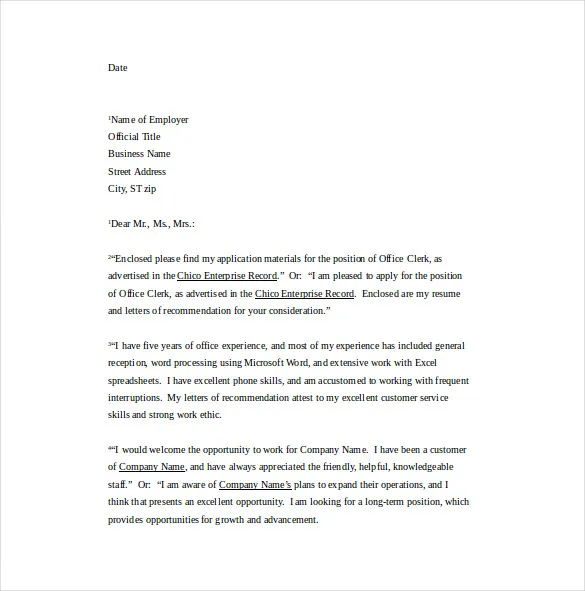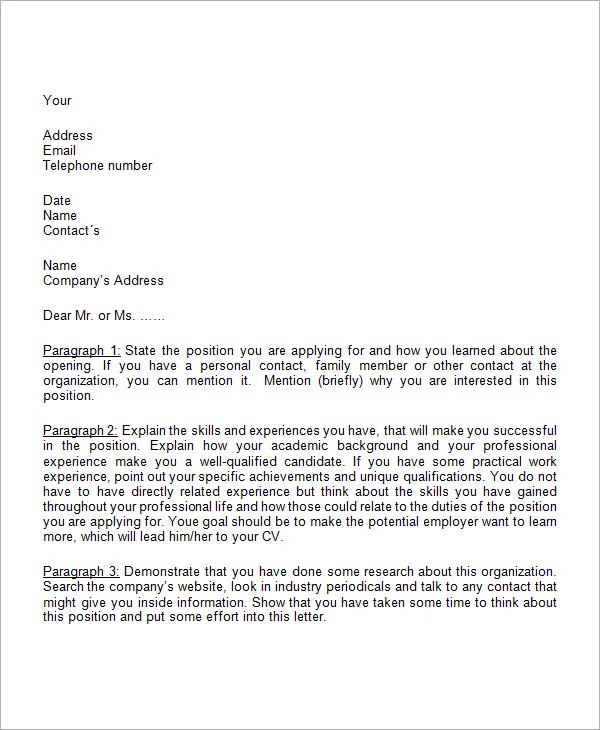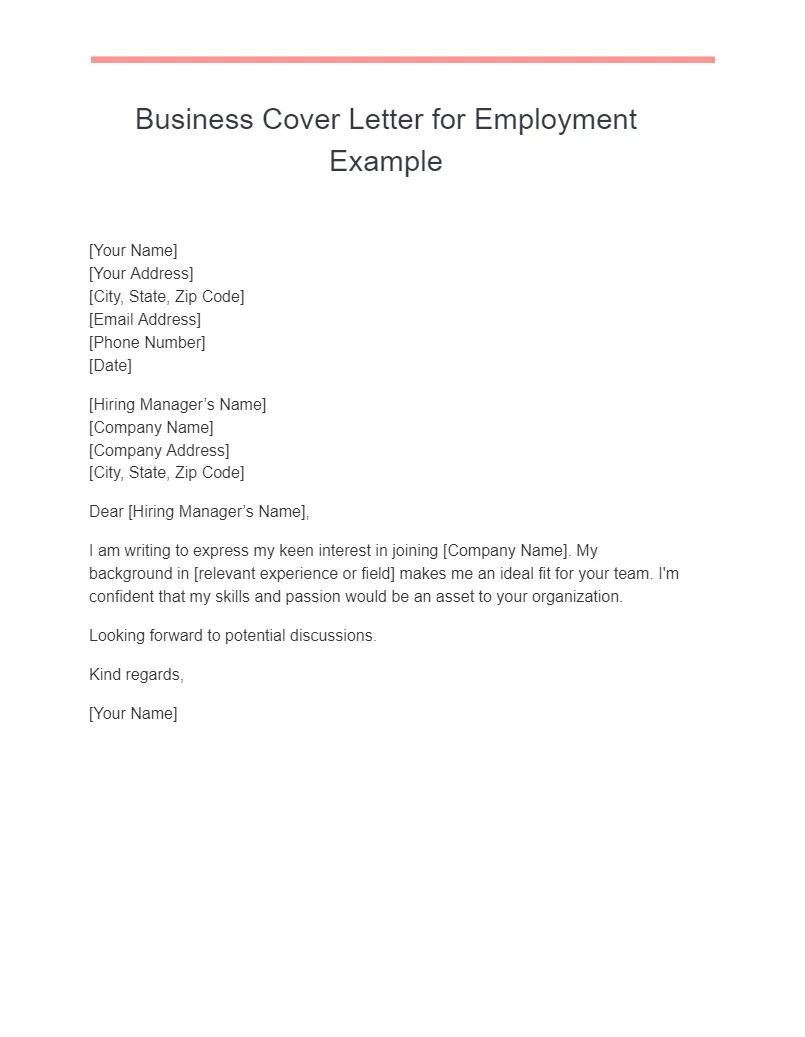Why a Cover Letter Matters for Your Business Application
In the competitive world of business, a cover letter serves as your initial introduction and a crucial component of your job application. It goes beyond the information provided in your resume, allowing you to showcase your personality, communication skills, and genuine interest in the role and the company. A well-crafted cover letter can significantly increase your chances of landing an interview. It offers a platform to elaborate on your qualifications, explain any career transitions, and demonstrate how your skills and experiences align with the specific requirements of the position. Furthermore, it provides an opportunity to address any potential gaps in your resume or to highlight aspects that might not be immediately apparent. The importance of a cover letter, particularly when you are applying for business positions, cannot be overstated because it is the initial impression that you make and could determine whether or not you will be given an interview.
Grabbing Attention with a Compelling Opening
The opening paragraph of your cover letter is your chance to make a strong first impression. To capture the reader’s attention, start with a concise and engaging statement that highlights your key skills or experiences. Instead of a generic greeting, personalize your letter by addressing the hiring manager by name if possible. State the position you are applying for and where you found the job posting. Immediately demonstrate your understanding of the company’s values, mission, or recent achievements. Briefly explain why you are interested in the role and the company, showing that you have done your research. The goal is to make the reader want to continue reading and learn more about what you have to offer. Remember, the first few sentences are critical to setting the tone and creating a positive impression, so make them count. Consider starting with a bold statement or a brief anecdote that ties your skills to the business’s needs.
Highlighting Your Relevant Skills and Experience

The body of your cover letter should focus on the skills and experiences most relevant to the job description. Carefully review the job posting and identify the key requirements. Then, provide specific examples of how you have demonstrated those skills in previous roles. Use action verbs to describe your accomplishments and quantify your achievements whenever possible. This section should demonstrate your value to the company by explaining how your skills and experience can contribute to their success. Tailor your letter to each application, emphasizing the skills and experiences that align with the specific requirements of the position. For example, if the job requires strong communication skills, provide an example of a time you successfully led a team or resolved a conflict through effective communication. Show, don’t just tell, how your qualifications make you the ideal candidate. Always relate your experience back to the requirements, to make sure you are clearly demonstrating why you should be hired.
Quantifying Your Achievements and Impact
To truly stand out, quantify your achievements whenever possible. Instead of simply stating that you ‘increased sales,’ provide specific numbers, such as ‘increased sales by 15% in one quarter.’ Use data and metrics to illustrate the impact of your work. For instance, if you managed a project, mention the budget, timeline, and outcomes achieved. If you improved efficiency, state the percentage or amount of time or money saved. Using numbers adds credibility to your claims and provides concrete evidence of your abilities. By quantifying your accomplishments, you provide a clear picture of your value to potential employers. Make sure you back up your claims with data to make sure your resume stands out from all others. Quantifying your achievements will make it so the employer can’t help but be impressed by your value.
Demonstrating Your Understanding of the Business
Show that you have researched the company and understand their business. Mention their recent achievements, products, services, or values that resonate with you. Demonstrate your knowledge of the industry and how the company fits within it. This demonstrates your genuine interest in the company and the role, which can significantly improve your chances of getting an interview. Tailor your letter to each specific company, avoiding generic statements. Explain why you are excited about the opportunity and what you can contribute to their future success. Showcase your understanding of the market, competitors, and industry trends. This section of your cover letter should convince the employer that you’re not just applying for a job, but that you’re applying to work for their company.
Expressing Enthusiasm and a Call to Action

End your cover letter with a clear expression of enthusiasm and a strong call to action. Reiterate your interest in the position and the company. Thank the hiring manager for their time and consideration. Include a call to action, such as ‘I look forward to the opportunity to discuss my qualifications further in an interview.’ Provide your contact information and make it easy for the reader to reach you. This shows your professionalism and eagerness to move forward in the hiring process. This is your final chance to make a lasting impression and encourage the reader to take the next step, so be sure to end with a confident and positive tone, leaving them with a positive impression of you as a candidate. Conclude your cover letter with a proactive call to action, expressing your eagerness to discuss your application further in an interview.
Proofreading and Formatting for Professionalism
Before submitting your cover letter, meticulously proofread it for any errors in grammar, spelling, and punctuation. Errors can undermine your credibility and make a negative impression. Use a professional font and layout that is easy to read. Ensure your letter is well-organized with clear paragraphs and spacing. Have a friend or career advisor review your cover letter for any mistakes or suggestions for improvement. A polished and professional cover letter reflects your attention to detail and commitment to quality, essential qualities in any business role. Make sure the tone is professional. Do not write the cover letter like you are writing to a friend. Always use formal language, which will make the employer more likely to hire you.
Using keywords
Be sure to strategically incorporate relevant keywords from the job description throughout your cover letter. This can help your application get noticed by applicant tracking systems (ATS). While not the only factor, incorporating keywords ensures that your qualifications align with the employer’s needs. Be careful not to overstuff your cover letter with keywords, as this can look unnatural. Instead, weave them in organically, using them naturally within the context of your writing. By doing so, you are making it easier for both human readers and ATS systems to understand your relevance for the position. Remember to tailor your keywords to each application, as the specific requirements will differ from job to job, and this is another critical element of your cover letter.
